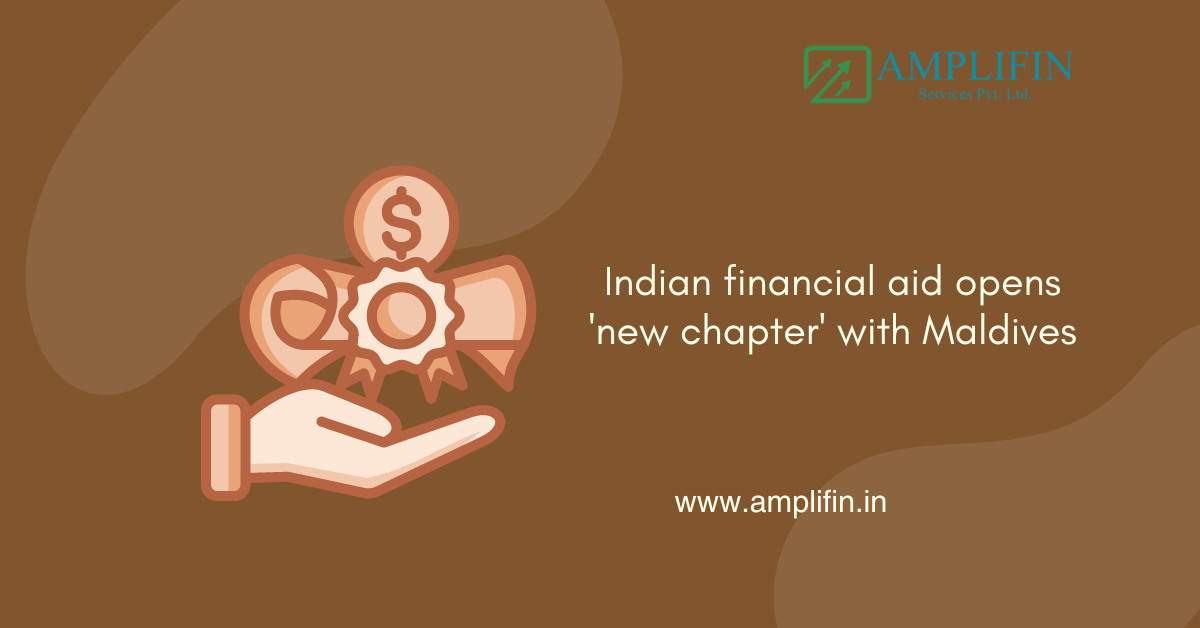Indian Financial Aid Opens ‘New Chapter’ with Maldives: Strengthening Ties in the Indian Ocean
In a significant move that has caught the attention of geopolitical observers worldwide, India has extended a substantial financial aid package to the Maldives, heralding what many are calling a “new chapter” in the relationship between these two Indian Ocean nations. This development comes at a crucial juncture, not only for the Maldives’ economic stability but also for the broader dynamics of the Indian Ocean region. As we delve into the details of this financial assistance and its implications, it becomes clear that this is more than just an economic transaction – it’s a strategic maneuver with far-reaching consequences for regional politics and security.

The Financial Package: A Lifeline for the Maldives
At the heart of this new chapter is a comprehensive financial package that India has offered to the Maldives. While the exact figures are still being finalized, initial reports suggest that the aid could amount to several hundred million dollars. This assistance comes in various forms, including direct budgetary support, currency swap arrangements, and investments in key infrastructure projects.
The timing of this aid is particularly noteworthy. The Maldives, like many small island nations, has been grappling with economic challenges exacerbated by global events such as the COVID-19 pandemic and climate change-related issues. The tourism-dependent economy of the Maldives has been especially vulnerable to external shocks, making this financial support from India a critical lifeline.
One of the key components of the package is believed to be a currency swap agreement, which will provide the Maldives with much-needed foreign exchange liquidity. This arrangement will help stabilize the Maldivian rufiyaa and boost investor confidence in the country’s economy. Additionally, India’s commitment to investing in infrastructure projects in the Maldives is expected to create jobs and stimulate long-term economic growth.
Diplomatic Significance: More Than Just Money
While the financial aspects of this aid package are substantial, the diplomatic significance of this move cannot be overstated. This gesture from India comes at a time when the geopolitical landscape of the Indian Ocean region is in flux, with various powers vying for influence.
By extending this generous aid package, India is not just helping a neighbor in need; it’s making a strong statement about its role as a regional leader and its commitment to the prosperity and stability of smaller nations in its sphere of influence. This move is likely to enhance India’s soft power in the region and could potentially influence the Maldives’ foreign policy orientations in the coming years.
The phrase “new chapter” in India-Maldives relations is apt, as it suggests a fresh start and renewed commitment from both sides. It’s worth noting that the relationship between these two countries has had its ups and downs in recent years, with concerns about the Maldives’ growing closeness to other regional powers, particularly China. This financial aid package could be seen as India’s effort to recalibrate the relationship and reassert its position as the Maldives’ primary regional partner.
Economic Implications for the Maldives
For the Maldives, the economic implications of this financial aid are profound. The country has been facing a series of economic challenges, including a high public debt burden, a narrow economic base heavily reliant on tourism, and vulnerabilities to external shocks. The Indian financial package is expected to address some of these issues in both the short and long term.
In the immediate future, the budgetary support and currency swap arrangements will help the Maldivian government manage its fiscal challenges and maintain economic stability. This could prevent a potential economic crisis and provide the government with the breathing room it needs to implement necessary economic reforms.
Looking at the longer term, India’s commitment to investing in infrastructure projects in the Maldives could have transformative effects on the island nation’s economy. These investments are likely to focus on critical areas such as transportation, renewable energy, and public services. By improving its infrastructure, the Maldives can enhance its tourism offerings, diversify its economy, and build resilience against future economic shocks.
Moreover, this financial assistance could serve as a catalyst for attracting further foreign investments to the Maldives. The confidence shown by India in the Maldivian economy could encourage other countries and international investors to look at the Maldives more favorably, potentially opening up new avenues for economic growth and development.
Regional Geopolitics: A Strategic Move by India
India’s financial aid to the Maldives must be viewed through the lens of regional geopolitics. The Indian Ocean has become an arena of increasing strategic competition, with countries like China, the United States, and regional powers all seeking to expand their influence. In this context, India’s move can be seen as a strategic effort to strengthen its position in this vital maritime region.
The Maldives, despite its small size, holds significant strategic importance due to its location. Situated along major sea lanes of communication in the Indian Ocean, the Maldives’ stability and alignment are crucial for regional security dynamics. By extending this substantial aid package, India is not only helping the Maldives but also securing its own strategic interests in the region.
This move by India could be interpreted as a response to growing Chinese influence in the Indian Ocean region. China has been actively engaging with countries in the area through its Belt and Road Initiative (BRI) and other economic and diplomatic efforts. India’s financial aid to the Maldives sends a clear message about its willingness and capacity to support its neighbors and maintain its role as a net security provider in the region.
Furthermore, this aid package could potentially influence the Maldives’ future foreign policy decisions. While it’s important to note that the Maldives, as a sovereign nation, will make its own policy choices, the strengthened economic ties with India could naturally lead to closer alignment on various regional and international issues.
Challenges and Opportunities
While the Indian financial aid package opens up new opportunities for both countries, it also comes with its own set of challenges. For the Maldives, the primary challenge will be to effectively utilize this aid to address its economic issues without creating new dependencies. The Maldivian government will need to implement sound economic policies and reforms to ensure that this financial assistance translates into sustainable economic growth.
There’s also the challenge of balancing relationships with different regional powers. While strengthening ties with India, the Maldives will need to navigate its relations with other countries carefully, maintaining its strategic autonomy and avoiding being caught in regional power struggles.
For India, the challenge lies in sustaining this level of engagement and ensuring that the aid leads to tangible improvements in bilateral relations. There will be expectations for India to follow through on its commitments and possibly expand its support in other areas as well.
However, these challenges also present significant opportunities. For the Maldives, this is a chance to not only address immediate economic concerns but also to lay the foundation for long-term economic resilience. The financial support and expertise from India can be leveraged to diversify the Maldivian economy, enhance its infrastructure, and build sustainable development models.
For India, successful implementation of this aid package could enhance its credibility as a reliable partner for smaller nations in the region. It’s an opportunity for India to showcase its commitment to regional development and its capabilities as a responsible regional power. This could potentially lead to stronger partnerships with other countries in the Indian Ocean region.
Looking Ahead: The Future of India-Maldives Relations
As we look to the future, the Indian financial aid package marks the beginning of what could be a transformative phase in India-Maldives relations. In the short term, the focus will likely be on the effective implementation of the financial aid and its immediate impact on the Maldivian economy. This will involve close cooperation between Indian and Maldivian officials to identify priority areas, design effective interventions, and monitor progress.
In the medium to long term, this financial assistance could pave the way for deeper economic integration between the two countries. We might see increased Indian investments in the Maldives, enhanced trade relations, and closer cooperation in sectors like tourism, fisheries, and renewable energy. There’s also potential for collaboration in emerging areas such as blue economy initiatives and digital technology.
Moreover, this strengthened economic partnership could lead to greater cooperation in other areas such as security, climate change mitigation, and cultural exchanges. The Indian Ocean region faces numerous shared challenges, from maritime security to environmental conservation, and a strong India-Maldives partnership could play a crucial role in addressing these issues.
It’s important to note that the success of this “new chapter” in India-Maldives relations will depend on consistent engagement and mutual respect for each other’s interests. Both countries will need to work together to ensure that this financial aid translates into tangible benefits for the Maldivian people and contributes to regional stability and prosperity.
Conclusion: A Milestone in Bilateral Relations
The Indian financial aid package to the Maldives represents a significant milestone in the bilateral relations between these two Indian Ocean neighbors. It demonstrates India’s commitment to supporting its regional partners and its willingness to play a leading role in promoting stability and prosperity in the region.
For the Maldives, this support comes at a critical time and offers an opportunity to address pressing economic challenges while laying the groundwork for sustainable long-term development. The success of this initiative could set a new standard for regional cooperation and development assistance in South Asia.
As this new chapter in India-Maldives relations unfolds, it will be closely watched by regional and global observers. The outcomes of this partnership could have far-reaching implications for regional dynamics, economic development models, and the future of diplomacy in the Indian Ocean region.
Key points to remember:
- India has extended a substantial financial aid package to the Maldives, marking a “new chapter” in bilateral relations.
- The aid includes direct budgetary support, currency swap arrangements, and investments in infrastructure projects.
- This move has significant diplomatic implications, reinforcing India’s role as a regional leader.
- For the Maldives, the aid addresses immediate economic challenges and offers opportunities for long-term development.
- The financial package is a strategic move by India in the context of evolving geopolitics in the Indian Ocean region.
- Challenges include effective utilization of aid and balancing regional relationships.
- Opportunities exist for deeper economic integration and cooperation in various sectors.
- The success of this initiative could influence regional dynamics and set new standards for cooperation in South Asia.
As this new chapter in India-Maldives relations continues to evolve, it will undoubtedly shape the future of not just these two nations, but potentially the entire Indian Ocean region. The world will be watching closely as this partnership develops, potentially setting new benchmarks for regional cooperation and economic diplomacy in an increasingly complex geopolitical landscape.
